*Apologies to the medievalists. Repeated below is our semi-annual appeal to UBC managers to Lay Down the Mace:
As we count down to May graduation, can we please remove the mace from convocation and governance at the University of British Columbia? The mace had its day in the first 100 years of this esteemed University but that day has gone.
Times have changed, business as usual has been called into question, the Board of Governors is still operating under the pall of a No Confidence vote cast by faculty members last year, and this year on 24 April an Open Letter signed by 110 faculty members was submitted to the UBC Chancellor Reappointment Committee.
The days of the mace in Convocation and governance are of the past and that part of the past is no longer worth reenacting.
Last year was an emotional year for UBC. As we launched the celebration of our Centennial at UBC 100, our President resigned under a cloak of secrecy. As we began to party, we launched an investigation to discover the lengths to which a Chair of the Board of Governors and administrators might go to suppress academic freedom. As no accountability was forthcoming, a No Confidence vote was cast. As the BoG continued with business as usual, staff and students expressed serious concerns to triangulate those of faculty members.
It’s difficult to know where this University now stands or what it stands for.
It is time to retire the mace, symbol of aggression, authority, and war. It’s time to march to graduation ceremonies in late May with open and empty hands as symbolic of peace and reconciliation of controversies and roles of the President’s Office.
UBC’s mace is a relic but a relic of what? The mace is symbolic speech but what is it saying about us now?
From ancient times, this club, this weapon of assault and offence, the mace was gradually adorned until the late twelfth century when it doubled as a symbol of civil office. Queen Elizabeth I granted her royal mace to Oxford in 1589. From military and civil power derives academic authority. The rest is history and it is not all good.
It is time to retire the macebearer, whose importance is inflated every year by the image’s presence on UBC’s graduation pages leading to Convocation. In pragmatic terms, if the mace falls into the hands of the wrong macebearer or manager at this point, someone’s liable to get clocked with it.
Is UBC’s mace still a respectable appendage to Convocation?
Remember, since that fateful November day in 1997, just five months into Martha Piper’s Presidency, when student activists put their bodies and minds on the line at the APEC protest, Tuum Est adorns both the can of mace sprayed in their eyes and the ceremonial mace that the President’s Office is eager to carry across campus every November and May.
Is it not time to retire the mace?

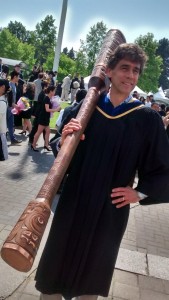
 Follow
Follow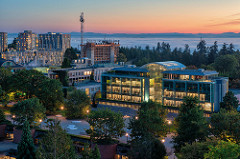
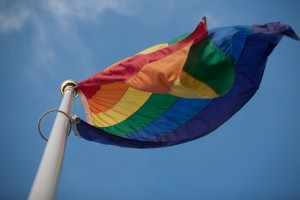
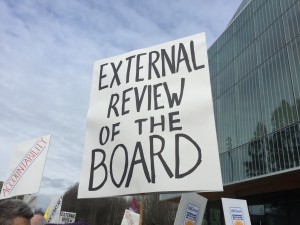
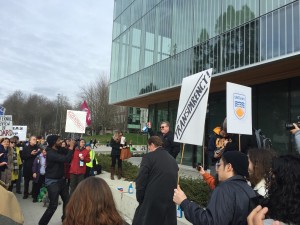
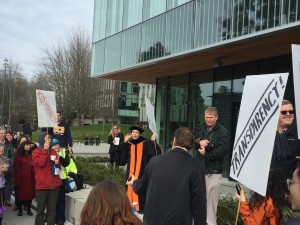
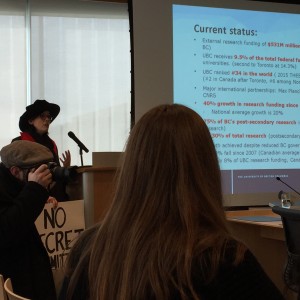
#UBC time to lay down the mace in graduation and governance #ubcnews #bced #highered
*Apologies to the medievalists again. Customized below is our semi-annual appeal to UBC managers to Lay Down the Mace:
As we count down to and roll through graduation, can we please remove the mace from convocation and governance at the University of British Columbia? The mace had its day in the first 100 years of this esteemed University but that day has gone.
Dalhousie University is currently embroiled in controversy over its mace, decorated as it is to demonstrate racial supremacy (“the rose, thistle, fieur-de-lys, and shamrock, depicting the major racial groups of our country”). Indigenous peoples and advocates have said enough already.
Some traditions just aren’t worth maintaining…
At the Nexo Knights’ Graduation Day,
Jestro grabbed a sword, a mace, and a spear and began to juggle them… The unimpressed crowd started to boo… Sweat broke out on his forehead…. He let go of the mace, and it flew across the arena. The crowd gasped and ducked… Then … bam! It hit the power grid on the arena wall. The area lights flickered, then turned off. Soon the power outage surged throughout the city.
Yes, this really did happen in a Lego story! And in England, Bradford College faculty members called the admin’s decision to spend £24,000 on a new mace for graduation ceremonies a “crass bit of judgement.”
At UBC, things were questionable again this past year. With an opportunity to follow faculty and staff members’ and students’ proposal to divest from fossil fuel investments, in mid February UBC chose to continue to be a part of the problem of climate change instead of the solution. Still heavily invested. And after chalking up a $22m budget surplus, in April & May UBC jumped the line at Wholefoods to draw $7,230 in grocery bag donations. On 24 April an Open Letter signed by 110 faculty members was submitted to the UBC Chancellor Reappointment Committee questioning the process.
The days of the mace in Convocation and governance are of the past and that part of the past is no longer worth reenacting.
It’s difficult to know where this University now stands or what it stands for.
It is time to retire the mace, symbol of aggression, authority, and war. It’s time to march to graduation ceremonies in late May and November with open and empty hands as symbolic of peace and reconciliation of controversies and roles of the President’s Office.
UBC’s mace is a relic but a relic of what? The mace is symbolic speech but what is it saying about us now?
From ancient times, this club, this weapon of assault and offence, the mace was gradually adorned until the late twelfth century when it doubled as a symbol of civil office. Queen Elizabeth I granted her royal mace to Oxford in 1589. From military and civil power derives academic authority. The rest is history and it is not all good.
Dr. Thomas Lemieux, School of Economics, with UBC’s Mace at the May 2015 Convocation.
It is time to retire the macebearer, whose importance is inflated every year by the image’s presence on UBC’s graduation pages leading to Convocation. In pragmatic terms, if the mace falls into the hands of the wrong macebearer or manager at this point, someone’s liable to get clocked with it.
Is UBC’s mace still a respectable appendage to Convocation?
Remember, since that fateful November day in 1997, just five months into Martha Piper’s Presidency, when student activists put their bodies and minds on the line at the APEC protest, Tuum Est adorns both the can of mace sprayed in their eyes and the ceremonial mace that the President’s Office is eager to carry across campus every November and May.
Is it not time to retire the mace?
Comments Off on #UBC time to lay down the mace in graduation and governance #ubcnews #bced #highered
Posted in Academic freedom, Academic Labor, Accountability, BC Education, Budgets, Commentary, Critical University Studies, Faculty, Governance, Maces, Shared governance, Students, Working conditions
Tagged Academic freedom, Faculty, Global Warming, Governance, Protests, Students, University presidents, Working conditions